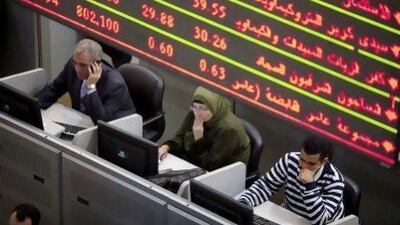Middle East markets are likely to be volatile this week amid political unrest in Egypt and Kuwait, adding to the negative sentiment already posed by unstable global markets.
Parliamentary elections in Egypt, scheduled to take place tomorrow, are expected to set the tone for the trading week.
"Egypt and Kuwait is not very good for the mood, and at the same time we are far from a solution in the euro zone," says Sebastien Henin, a portfolio manager at Abu Dhabi's The National Investor.
Egypt's EGX 30 Index tumbled to its lowest level in 32 months after days of clashes between protesters and security forces. It was down 6 per cent to 3,780.13 points at close of play on Friday - and is down 47 per cent so far this year.
"Unless overall political conditions improve in the coming days, Egypt's equity markets could be hit when they open on Tuesday, and bond yields could rise," says Said Hirsh, the Middle East economist at Capital Economics in London.
Egypt's state TV reported on Friday the country's ruling military council had appointed Kamal El Ganzouri, the former prime minister, to lead the next government, following the resignation of the previous cabinet last week.
"On the face of it, and of course if these reports are confirmed, this looks like good news for Egypt's economy," says Mr Hirsh.
Mr El Ganzouri was the prime minister from 1996 to 1999 when he played a key role in improving relations with the IMF and World Bank.
"Given the fact that Egypt is in urgent need of external funding from the IMF, or elsewhere, he appears to be an ideal candidate, assuming of course that the military council grants him full authority in terms of decision-making," Mr Hirsh says. "With elections due, we don't think that the appointment of Mr El Ganzouri alone will help Egypt to avoid a full-blown political and economic crisis."
Kuwait's market, not nearly as turbulent as Egypt's, fell 0.7 per cent to 5,782 points, approaching a seven-year low of 5,746 hit in August, as politics dominated economics.
The public prosecutor on Tuesday ordered the arrest of 45 people accused of involvement in the storming of parliament on November 16 after clashes with riot police that followed a large protest demanding the resignation of the prime minister and the dissolution of parliament.
"The political situation in Kuwait is pretty serious at the moment," Nawaf Al Refaie, the deputy chief executive at Ahli Capital Investment told Reuters.
"Investors are now terrified by the recent unrest which affected the market, not just in terms of percentage loss but also in terms of valuations, volumes and overall liquidity."
Kuwait's economic policymaking has been plagued by disputes between parliament and the cabinet, delaying decisions on reforms and major investment projects.
Kuwait, an Opec member, sits on about 10 per cent of global crude oil reserves and currently pumps about 3 million barrels per day.
In Europe, the focus remains on borrowing rates. On Friday, yields on Italy's bonds rose to 7.5 per cent from 6.64 per cent a week ago, heightening the danger for the region's debt crisis contagion.
UAE markets are expected to remain depressed for some time.
"There are no more catalysts - now that third-quarter results are out - to lift markets," says Fadi Al Said, a senior fund manager at ING Investment Management in Dubai.
The Abu Dhabi Securities Exchange General Index fell 1.7 per cent to 2,518.13, while the Dubai Financial Market General Index lost 1.3 per cent to 1,348.59.
Elsewhere in the region: Bahrain's measure lost 1.8 per cent to 1,161.34; Oman's MSM 30 Index moved 1.2 per cent to 5,428.52; Qatar's QE Index lost 1.6 per cent to 8,564.59; The Saudi Tadawul All-Share Index moved 0.47 per cent lower to 6,057.59 yesterday.

